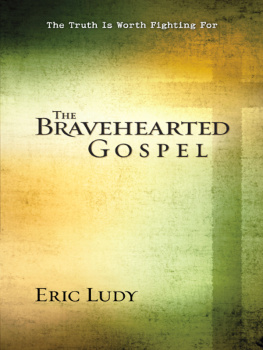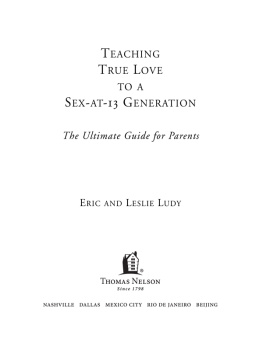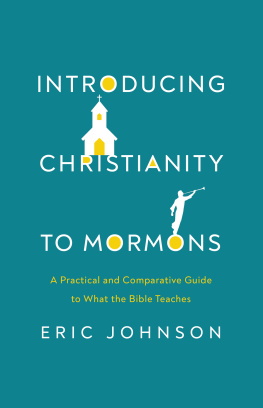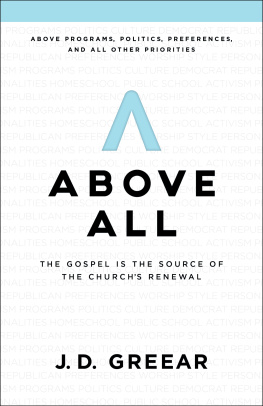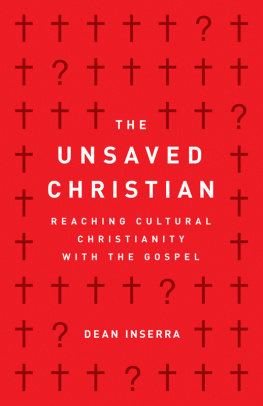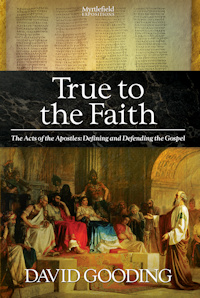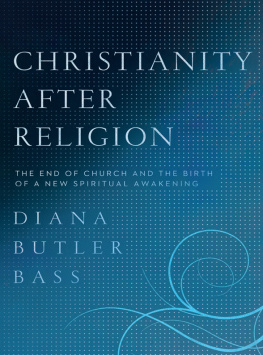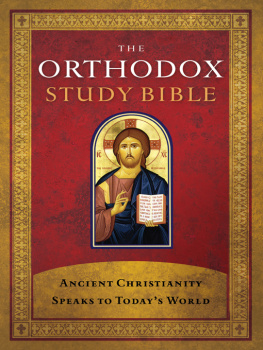

HARVEST HOUSE PUBLISHERS
EUGENE, OREGON
All Scripture quotations are taken from the King James Version of the Bible.
Eric Ludy: Published in association with Loyal Arts Literary Agency, LoyalArts.com.
Cover by Abris, Veneta, Oregon
THE BRAVEHEARTED GOSPEL
Copyright 2008 by Winston and Brooks, Inc.
Published by Harvest House Publishers
Eugene, Oregon 97402
www.harvesthousepublishers.com
Library of Congress Cataloging-in-Publication Data
Ludy, Eric.
The bravehearted Gospel / Eric Ludy.
p. cm.
ISBN 978-0-7369-2164-0 (pbk.)
ISBN 978-0-7369-3131-1 (eBook)
1. Christianity and culture. I. Title.
BR115.C8L87 2008
243dc22
2008012049
All rights reserved. No part of this electronic publication may be reproduced, stored in a retrieval system, distributed, or transmitted in any form or by any meanselectronic, mechanical, digital, photocopy, recording, or any otherwithout the prior written permission of the publisher. The authorized purchaser has been granted a nontransferable, nonexclusive, and noncommercial right to access and view this electronic publication, and purchaser agrees to do so only in accordance with the terms of use under which it was purchased or transmitted. Participation in or encouragement of piracy of copyrighted materials in violation of authors and publishers rights is strictly prohibited.

I spent five years of my life, starting at the age of 20, praying fervently for what I termed a father of the faitha man who would introduce me to the terrain of the deeper life and inaugurate me into the fellowship of the burning heart. Yet Gods answer to my years of tireless prayer merely proved to me His divine sense of humor. For instead of a father, God gave me something altogether unexpected. With a heavenly wink and a curious smile, He gave me Ben, a man four years younger than me.
I cant tell you how many times I have trembled with the sweetest conviction as Ben boomed the truth of Heaven into my soul. I trace my first encounter with many of the epic themes packaged within this book back to a conversation with this Luther-like man. It was Ben who showed me the match and said, Strike it and set it to the kindling of your soul! This book is merely the summation of our eight-year friendship. In many ways, its simply a quotation of Bens heart and life.
Ben, I know you labor for Heavens reward alone, but please receive my deepest gratitude. This book is for you. May it always be a reminder that even the hidden years of our lives are not without an effect on this dying world. You have helped beget a man of fire. May I merely be the first of many.
C ONTENTS
B rown is the new black; emergent is the new Reformationor at least so some would claim. Like it or not, something new is afoot. After decades of defending the status quo, a cry is now being raised from every quarter, from both young and old alike, for a living, breathing, authentic rendition of the Christian faith that will stoke the fires of the soul, bring back the meaning to life, and revive an ailing church to its very foundations.
In response to this call, something new this way comes. For better or for worse, something is emerging out of the depths of the traditional church. This is not a question; it is a statement of fact. But will this emergent church bring us closer to the truth, as in the Reformation, or lead us further from it?
This book could rightly be labeled emergent. Its no great defender of decaying institution, nor is it friend to outmoded and outdated traditions and ritual. And yet, while the rallying cry for drastic change will be heard distinctly within the following pages, it should be noted that the changes being championed between the covers of this book will appear new only to the minds of modern Christians. This seemingly new thing of emerging from the morass of modern, lukewarm religion is in fact as old as the Roman Empire and as venerable as time itself. The burning heart of the ancient faith must once again come to beat in the breast of Christs followers in the twenty-first century, or all is lost.
The truths shouted from every paragraph you are about to read only sound new but they are not. They are certainly emergent in relation to the modern church, but they are undoubtedly historic in regards to the foundations of Christianity.
It is true we must emerge from the ghetto of religion or we die. But we must emerge with historical Christianity intact, or we will have saved our life only to lose it in the end.
Eric has written an unflinchingly historic emergent book. With sometimes ruthless intensity and a pen that often cuts as deeply as a sword, he sets about the thankless task of scraping off the barnacles of error that over time have attached themselves to the truth; while with equal fervor he defends the ancient faith that was once and for all delivered to the saints, refusing to throw the baby out with the barnacles.
Keep this in mind as you read. The radical new stance being pressed with both clarity and passion in the upcoming chapters is not some newfangled theological novelty but is rooted and grounded in none other than the life, teachings, and example of Jesus Christ.
I guess that brings up an important question: What was Jesus like?
After all, if He is the historic example of everything that we are to be at this very moment in time, then what was He like?
If we could, just for a moment, emerge from our cocoon of political and religious correctness, and if we would be willing to lay down all prejudice and preconceived notions and stare the historic man Himself in the face, the results might be so shockingly foreign to our minds that we may find this historic Jesus emerging as unrecognizable to our modern Christian sensibilities; and all this, not because we invented something new, but because we returned to something old.
Most of us have heard that God is love, that God became flesh, and that Jesus was His name. However, it is a stunning truth that it is not enough to merely say that Jesus was loving, or that He was loved, or even that He knew how to love. Jesus was love, He was the very essence of the stuff, bound up in blood, bone, and sinew; He was love walking on two feet, breathing the dusty air of Judea, living to give life to men.
Jesus was perfect, and He lived the only perfect life thats ever been lived. These words are well-worn and have been repeated more times than can be numbered. But do we realize the practical implications of such a statement? It means that in all things, and at all times, Jesus was perfectly loving, perfectly unselfish, and perfectly humble. He was perfectly righteous, and perfectly holy. In fact He was perfect in every way. The Bible says that He was without sin. Jesus was blameless. Not once in His life was He ever arrogant, boastful, or proud. The number of times that Jesus spoke an unkind word or mindlessly lashed out with His tongue came to a grand total of zero. He had no blind spots. His doctrine was pure. He never erred in His teaching by placing an over- or underemphasis on any doctrine. He never spoke out of prejudice, mere opinion, or dogma. He transcended His culture. He spoke only what His Father gave Him to speak, and His words were the words of God. He came to serve others, not to be served Himself. He made no attempt to manipulate the masses for His own gain, but lived humbly and without pretension. He was approachable. Women, children, tax collectors, prostitutes, and even lepers came to Jesus and were never turned away. He taught that we should love one another, that we should treat others as we ourselves would like to be treated, and that we should do good even to those who use and mistreat us.
Next page
